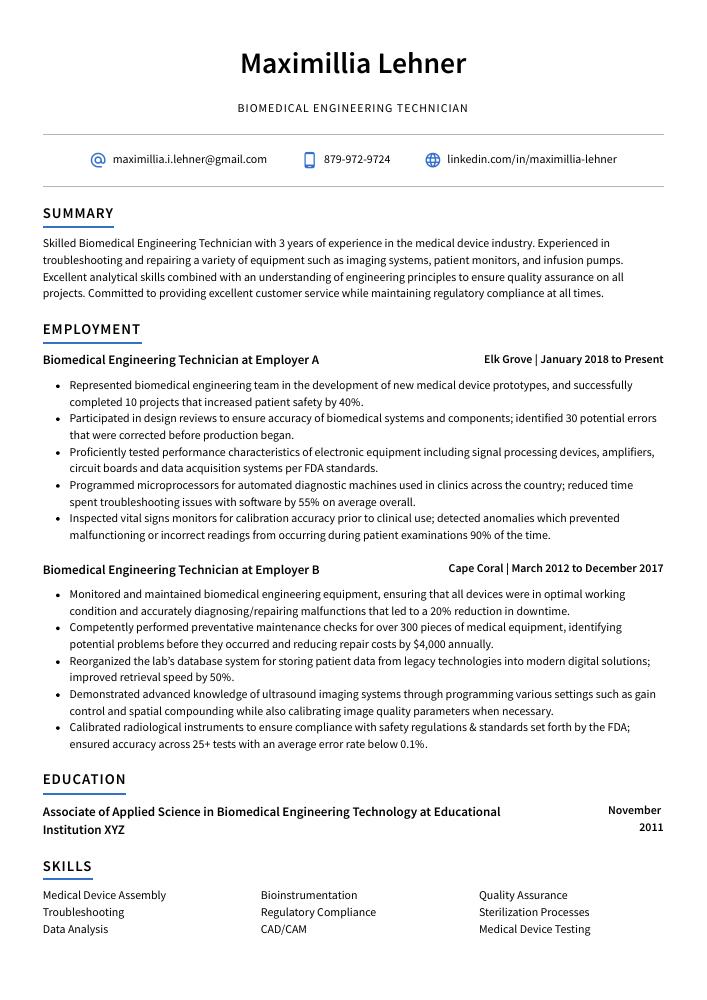Biomedical Engineering Technician Resume Guide
Biomedical engineering technicians work to apply engineering principles and techniques to solve problems in the fields of biology and medicine. They use their skills in electrical, mechanical, chemical or biomedical engineering to design, build and maintain medical equipment such as prosthetics, artificial organs or diagnostic machines. They also may be responsible for testing new products and conducting research related to healthcare technology development.
Your expertise in biomedical engineering is unparalleled, but hiring managers don’t know about it yet. To make them aware of your technical skills and experiences, you must create a resume that stands out from the rest.
This guide will walk you through the entire process of creating a top-notch resume. We first show you a complete example and then break down what each resume section should look like.
Table of Contents
The guide is divided into sections for your convenience. You can read it from beginning to end or use the table of contents below to jump to a specific part.
Biomedical Engineering Technician Resume Sample
Maximillia Lehner
Biomedical Engineering Technician
[email protected]
879-972-9724
linkedin.com/in/maximillia-lehner
Summary
Skilled Biomedical Engineering Technician with 3 years of experience in the medical device industry. Experienced in troubleshooting and repairing a variety of equipment such as imaging systems, patient monitors, and infusion pumps. Excellent analytical skills combined with an understanding of engineering principles to ensure quality assurance on all projects. Committed to providing excellent customer service while maintaining regulatory compliance at all times.
Experience
Biomedical Engineering Technician, Employer A
Elk Grove, Jan 2018 – Present
- Represented biomedical engineering team in the development of new medical device prototypes, and successfully completed 10 projects that increased patient safety by 40%.
- Participated in design reviews to ensure accuracy of biomedical systems and components; identified 30 potential errors that were corrected before production began.
- Proficiently tested performance characteristics of electronic equipment including signal processing devices, amplifiers, circuit boards and data acquisition systems per FDA standards.
- Programmed microprocessors for automated diagnostic machines used in clinics across the country; reduced time spent troubleshooting issues with software by 55% on average overall.
- Inspected vital signs monitors for calibration accuracy prior to clinical use; detected anomalies which prevented malfunctioning or incorrect readings from occurring during patient examinations 90% of the time.
Biomedical Engineering Technician, Employer B
Cape Coral, Mar 2012 – Dec 2017
- Monitored and maintained biomedical engineering equipment, ensuring that all devices were in optimal working condition and accurately diagnosing/repairing malfunctions that led to a 20% reduction in downtime.
- Competently performed preventative maintenance checks for over 300 pieces of medical equipment, identifying potential problems before they occurred and reducing repair costs by $4,000 annually.
- Reorganized the lab’s database system for storing patient data from legacy technologies into modern digital solutions; improved retrieval speed by 50%.
- Demonstrated advanced knowledge of ultrasound imaging systems through programming various settings such as gain control and spatial compounding while also calibrating image quality parameters when necessary.
- Calibrated radiological instruments to ensure compliance with safety regulations & standards set forth by the FDA; ensured accuracy across 25+ tests with an average error rate below 0.1%.
Skills
- Medical Device Assembly
- Bioinstrumentation
- Quality Assurance
- Troubleshooting
- Regulatory Compliance
- Sterilization Processes
- Data Analysis
- CAD/CAM
- Medical Device Testing
Education
Associate of Applied Science in Biomedical Engineering Technology
Educational Institution XYZ
Nov 2011
Certifications
Certified Biomedical Equipment Technician (CBET)
International Certification Commission
May 2017
1. Summary / Objective
Your resume summary should be a concise, yet compelling snapshot of your skills and experience as a biomedical engineering technician. Include details such as the types of medical equipment you have worked with, any certifications or licenses you possess, and how you successfully troubleshooted complex issues in the past. You could also mention that you are knowledgeable about industry regulations and safety protocols.
Below are some resume summary examples:
Proficient Biomedical Engineering Technician with 7+ years of experience in the medical device industry. Experienced in troubleshooting, testing and calibrating a wide range of biomedical equipment as well as overseeing its maintenance operations. Seeking to join ABC Medical Technologies where I can use my expertise to guarantee patient safety and satisfaction while also contributing to product development processes.
Determined and experienced biomedical engineering technician offering five years of experience in medical device research and development. Skilled at troubleshooting, calibrating, and testing a wide variety of equipment such as cardiac pacemakers, MRI machines, X-ray systems and more. Achieved successful results with the design of six patentable inventions for ABC Corporation while complying with FDA requirements.
Dependable and highly skilled biomedical engineering technician with 5+ years of experience in designing, constructing, and testing medical equipment. At XYZ Hospital, maintained a high quality standard for all instruments used in the facility. Developed a new system to improve inventory tracking accuracy by 10%. Seeking an opportunity at ABC Company where I can utilize my skillset and contribute to its success.
Reliable and detail-oriented Biomedical Engineering Technician with 8+ years of experience in healthcare engineering and maintenance. Experienced in developing, testing, commissioning, repairing and servicing medical equipment for hospitals and clinics. Proven ability to troubleshoot various equipment issues quickly and accurately. Seeking a role at ABC Healthcare as part of their biomedical engineering team.
Hard-working biomedical engineering technician with 3+ years of experience in the medical device industry. Experienced in troubleshooting, repairing and maintaining biomedical equipment for hospitals and clinics. Skilled at conducting safety inspections and preventive maintenance to ensure optimal performance of devices. Proven ability to work independently as well as part of a team while meeting deadlines.
Talented biomedical engineering technician with 9+ years of experience in calibrating, repairing, and testing medical equipment. Seeking to join ABC Tech as a biomedical engineering technician where I can utilize my expertise in troubleshooting and diagnostics for the benefit of their clients. In previous roles, improved maintenance turnaround times by 15% while reducing costs by 12%.
Passionate and detail-oriented biomedical engineering technician with 4+ years of experience in the medical device industry. Experienced in all stages of product development, including design and prototyping, testing and validation, manufacturing support and troubleshooting. Seeking to leverage expertise to join ABC Medical’s R&D team as a Biomedical Engineering Technician.
Committed and detail-oriented Biomedical Engineering Technician with 5+ years of experience in medical device assembly and repair. Seeking to join ABC Tech to use my technical expertise and problem-solving skills to help maintain their cutting edge products. At XYZ, improved diagnostic accuracy by 12% through systematic validation protocols implemented on all devices.
2. Experience / Employment
In the experience/employment/work history section, you should list your roles in reverse chronological order, with the most recent job listed first.
Stick to bullet points for this section; it allows the reader to quickly digest what you have done and achieved. When writing out each point, try to provide detail on what exactly was accomplished and any results that were obtained as a result of your work.
For example, instead of saying “Performed tests,” you could say “Conducted biocompatibility testing on medical devices using ISO 10993 standards, resulting in successful certification from regulatory bodies.”
To write effective bullet points, begin with a strong verb or adverb. Industry specific verbs to use are:
- Assembled
- Installed
- Calibrated
- Monitored
- Troubleshot
- Operated
- Programmed
- Tested
- Analyzed
- Inspected
- Repaired
- Fabricated
- Documented
- Upgraded
Other general verbs you can use are:
- Achieved
- Advised
- Assessed
- Compiled
- Coordinated
- Demonstrated
- Developed
- Expedited
- Facilitated
- Formulated
- Improved
- Introduced
- Mentored
- Optimized
- Participated
- Prepared
- Presented
- Reduced
- Reorganized
- Represented
- Revised
- Spearheaded
- Streamlined
- Structured
- Utilized
Below are some example bullet points:
- Analyzed patient data, test results and medical records to formulate plans for surgical implants & instrumentation; reduced hospital costs by 15% through efficient use of resources.
- Formulated detailed reports on the efficacy of various biomedical devices, systems and equipment based on clinical trials conducted with over 300 patients in different health care settings.
- Prepared materials used in laboratory tests such as cultures, reagents and solutions while strictly adhering to safety protocols set forth by OSHA standards; minimized contamination rates by 10%.
- Actively monitored patient progress post-treatment using a variety of scanning technologies (MRI/CT) ensuring that all implants were functioning properly with no adverse effects reported; successfully maintained a 100% success rate across all cases handled this year.
- Upgraded existing healthcare machinery according to manufacturer specifications each month to ensure that quality control measures are met consistently across all procedures carried out within the facility; improved device accuracy ratings from 85%-99%.
- Tested and troubleshot various biomedical equipment to diagnose and resolve malfunctions; completed 96% of repairs on the same day.
- Achieved a 95% customer satisfaction rating through excellent communication and timely repair services for complex medical devices.
- Streamlined processes for calibrating, maintaining, repairing, modifying and validating biomedical engineering instruments; reduced average servicing time by 34%.
- Substantially increased efficiency in handling maintenance requests from healthcare facilities by implementing new inventory management systems across 4 regional offices.
- Developed 40+ custom applications using C++ language that enabled automated tracking of patient data during clinical trials with a 99% accuracy rate.
- Spearheaded the design and implementation of biomedical devices, resulting in a 10% increase in efficiency.
- Compiled detailed reports on the performance of medical equipment, enabling technicians to diagnose problems quickly and accurately.
- Optimized existing systems for greater accuracy and cost-effectiveness; reduced unnecessary expenses by $4,000 annually.
- Assessed new medical technologies for their suitability to be used within healthcare settings; successfully introduced 5 new products into the market with positive feedback from users/patients alike.
- Meticulously monitored patients’ vitals during trials using specialized software programs while ensuring patient safety standards were met at all times.
- Thoroughly tested and inspected medical equipment, such as X-ray machines and MRI scanners for compliance with safety standards; reduced malfunction rate by 10%.
- Documented all product tests conducted in accordance with laboratory protocols; cut down on report preparation time by 20% through implementation of automation software.
- Operated a wide range of biomedical engineering technology, including electrocardiographs (ECGs), sonograms and endoscopes to diagnose patient conditions accurately.
- Fabricated custom parts using Computer Numerical Control (CNC) machinery while adhering to strict production deadlines; completed 80+ components within budget in the last quarter alone.
- Installed over 50 pieces of complex diagnostic machinery at healthcare facilities across 5 states; achieved 100% customer satisfaction ratings each time via meticulous troubleshooting techniques.
- Assembled, tested and maintained a wide range of medical equipment, including x-ray machines, MRI systems and ultrasound devices; achieved 95% accuracy in the assembly process.
- Utilized troubleshooting techniques to identify system faults and malfunctions quickly; reduced repair time by an average of 30 minutes per device.
- Revised existing biomedical engineering designs for improved performance outcomes according to industry standards; successfully redesigned 10+ pieces of equipment with increased efficiency ratings up to 20%.
- Reliably monitored instruments through regular inspections and calibrations while ensuring that regulatory compliance was met at all times; improved safety protocols by 25%.
- Mentored junior technicians on proper maintenance procedures for various types of medical technology, leading them towards successful completion rates on 80+ projects over 1 year period.
- Reduced equipment downtime by 25% through efficient maintenance and repair of biomedical devices; upgraded components on over 500 pieces of equipment to ensure peak performance.
- Coordinated with medical staff in the testing, calibration and installation of new biomedical engineering systems; successfully integrated 5 state-of-the-art machines into existing hospital infrastructure within a two week period.
- Structured preventative maintenance plans for all complex bioengineering instruments, resulting in a 20% improvement in efficiency across all clinical tests conducted at the laboratory facility.
- Repaired malfunctioning parts on up to 15 biomaterials per day using specialized tools like multimeters & soldering irons; maintained inventory records for spare parts and sourced replacements when necessary from suppliers around the world.
- Accurately documented test results from environmental simulations and analyzed data obtained from experiments involving organic materials such as proteins & enzymes under different conditions.
- Improved the accuracy and performance of biomedical equipment by troubleshooting up to 25 issues per day, resulting in a 14% reduction of maintenance costs.
- Advised hospital staff on the proper usage of medical instruments and software; provided hands-on support when needed to ensure patient safety.
- Troubleshot complex technical problems with both hardware and software components for various types of medical devices; reduced repair times from 4 hours to 2 hours on average.
- Effectively managed the installation, calibration and setup process for new biomedical systems across multiple hospitals within 24 hour deadlines each week, saving $1,000 in labor expenses over 6 months.
- Introduced innovative solutions that increased device uptime rates by 18%, improving overall system reliability for all healthcare facilities involved.
- Presented technical advice and guidance on biomedical engineering principles to over 100 healthcare professionals, leading to the successful installation of 10+ medical devices in various clinical settings.
- Successfully maintained and calibrated 35+ pieces of laboratory equipment for use with research projects within a budget; achieved an average cost savings of 20% per quarter.
- Facilitated quality assurance testing activities, identifying discrepancies in project specifications which resulted in modifications that improved overall product reliability by 25%.
- Expedited production times through the implementation of automated processes; increased output rate by 40% while simultaneously reducing labor costs by $7000/monthly cycle.
3. Skills
Two organizations that have advertised for a position with the same title may be searching for individuals whose skills are quite different. For instance, one may be looking for someone with experience in medical device design, while the other wants a technician who is knowledgeable about imaging technology.
Therefore, it’s important to tailor the skills section of your resume to each job that you are applying for. This will help ensure that applicant tracking systems (which scan resumes for certain keywords) pass on your resume to human recruiters and hiring managers.
In addition, take some time to discuss key skills in more detail throughout other sections of your resume; this can give employers an even better understanding of how qualified you are for their position.
Below is a list of common skills & terms:
- Bioinstrumentation
- CAD/CAM
- Data Analysis
- Medical Device Assembly
- Medical Device Testing
- Quality Assurance
- Regulatory Compliance
- Sterilization Processes
- Technical Documentation
- Troubleshooting
4. Education
Mentioning your education section on your resume will depend on how far along you are in your career. If you just graduated and have no prior experience, include the education section below your resume objective. However, if you have several years of work experience as a biomedical engineering technician with plenty to showcase, omitting the education section is perfectly acceptable.
If an education section is included, try to mention courses and subjects related to the job role that highlight skills relevant for a biomedical engineering technician position.
Associate of Applied Science in Biomedical Engineering Technology
Educational Institution XYZ
Nov 2011
5. Certifications
Certifications are a great way to demonstrate your expertise in a particular field. They show potential employers that you have taken the time and effort to become certified by an accredited organization, which can help set you apart from other job applicants.
When listing certifications on your resume, make sure they are relevant to the position for which you are applying. This will give hiring managers confidence that you possess the necessary skills and knowledge needed for success in their company.
Certified Biomedical Equipment Technician (CBET)
International Certification Commission
May 2017
6. Contact Info
Your name should be the first thing a reader sees when viewing your resume, so ensure its positioning is prominent. Your phone number should be written in the most commonly used format in your country/city/state, and your email address should be professional.
You can also choose to include a link to your LinkedIn profile, personal website, or other online platforms relevant to your industry.
Finally, name your resume file appropriately to help hiring managers; for Maximillia Lehner, this would be Maximillia-Lehner-resume.pdf or Maximillia-Lehner-resume.docx.
7. Cover Letter
Including a cover letter with your resume is a great way to give recruiters and hiring managers more insight into who you are as an individual. It should include 2 to 4 paragraphs that provide additional information about your professional experience, skillset and interests relevant to the role in question.
Cover letters can be highly beneficial when it comes to job applications; they enable you to personally explain why you’re an ideal candidate for the position, allowing employers to get a better understanding of what makes you unique compared with other applicants.
Below is an example cover letter:
Dear Christa,
I am writing to apply for the Biomedical Engineering Technician position at XYZ Hospital. I am a recent graduate of Northeastern University with a degree in biomedical engineering and have experience working in a hospital setting. In my previous role as an intern at Boston Children’s Hospital, I shadowed doctors and nurses and observed various medical procedures. I also assisted with patient care by transporting them to different areas of the hospital and providing support during their stay.
My coursework has provided me with knowledge of human anatomy, physiology, and medical imaging modalities. I am familiar with common biomedical devices such as pacemakers, defibrillators, artificial joints, and stents. My experience in customer service will be valuable in interacting with patients and their families. I am able to work independently as well as part of a team and am comfortable completing tasks with little supervision.
I believe my skills and background make me an ideal candidate for this position. I would welcome the opportunity to learn more about your hospital’s biomedical engineering department and contribute to its success. Thank you for your consideration; please do not hesitate to contact me if you have any questions or need additional information about my qualifications.
Sincerely,
Maximillia
Biomedical Engineering Technician Resume Templates
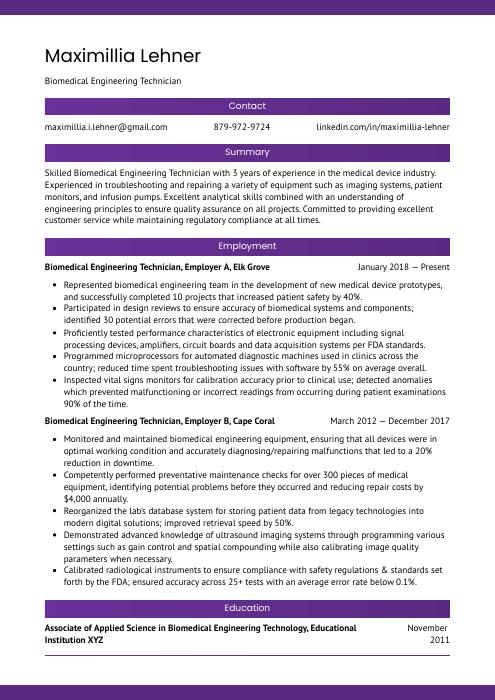 Jerboa
Jerboa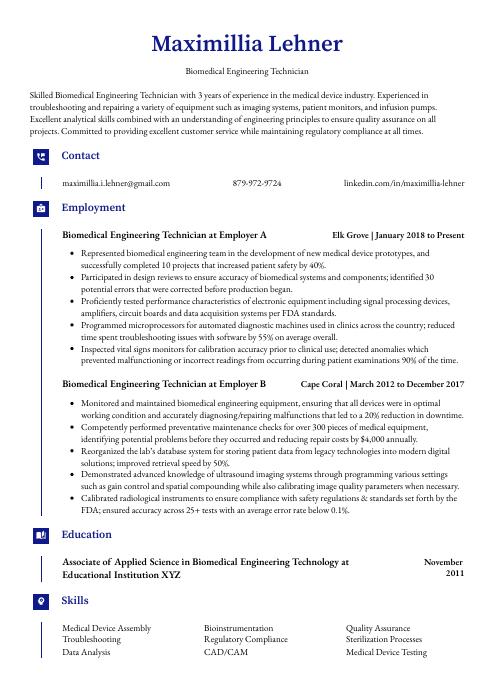 Gharial
Gharial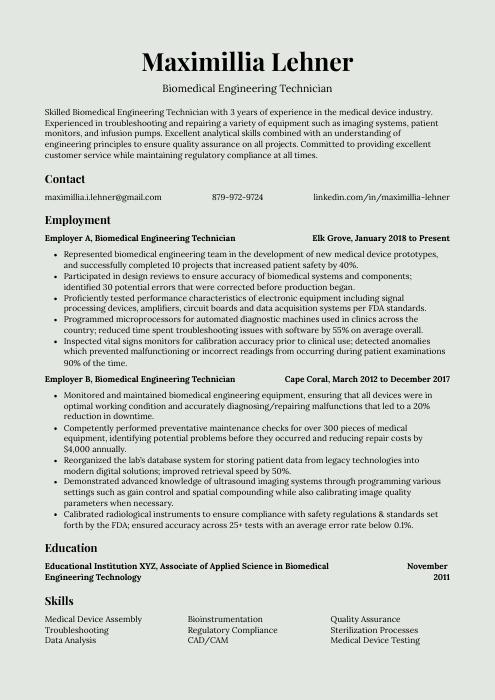 Saola
Saola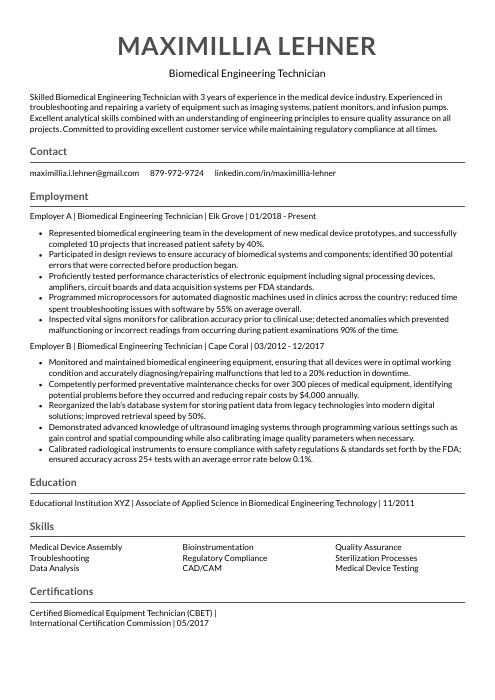 Indri
Indri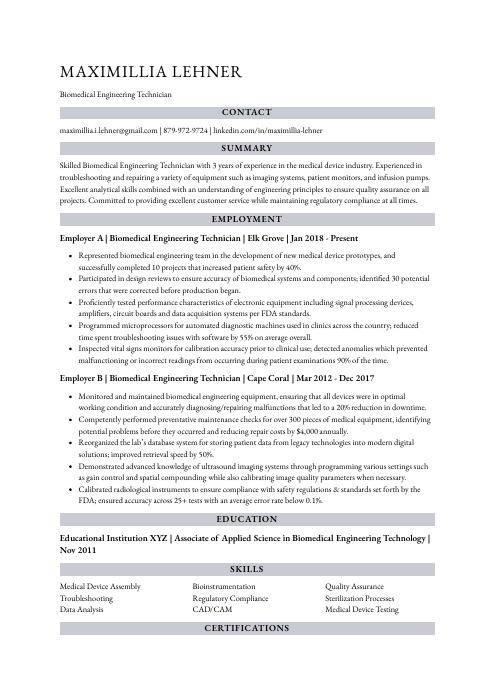 Numbat
Numbat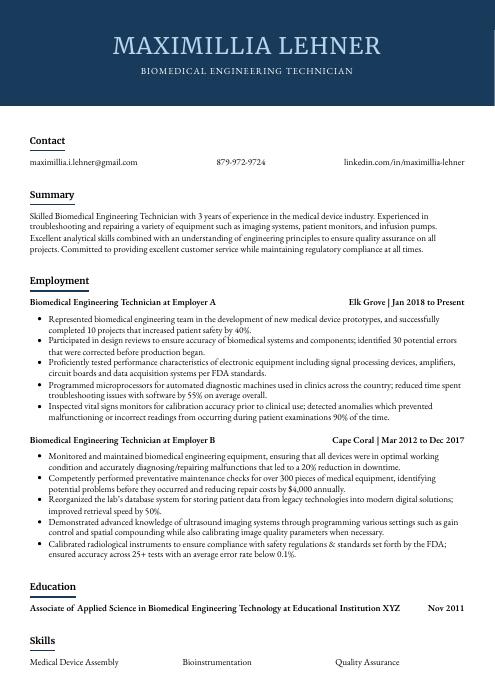 Bonobo
Bonobo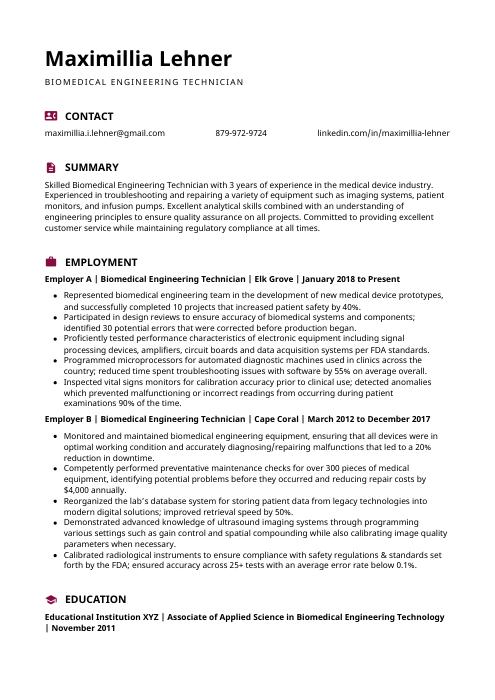 Hoopoe
Hoopoe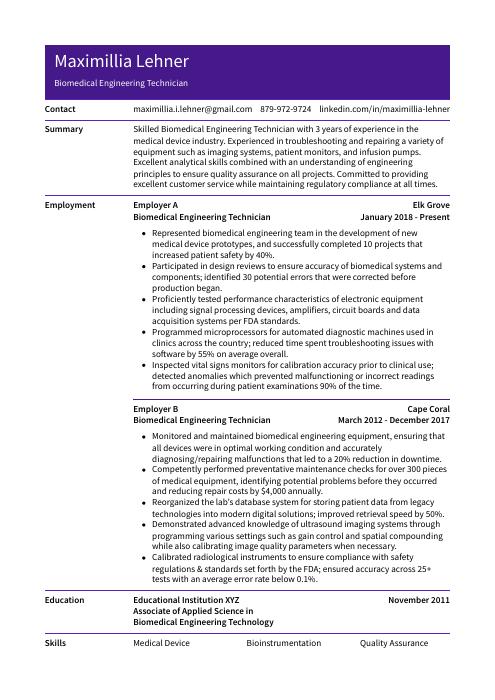 Pika
Pika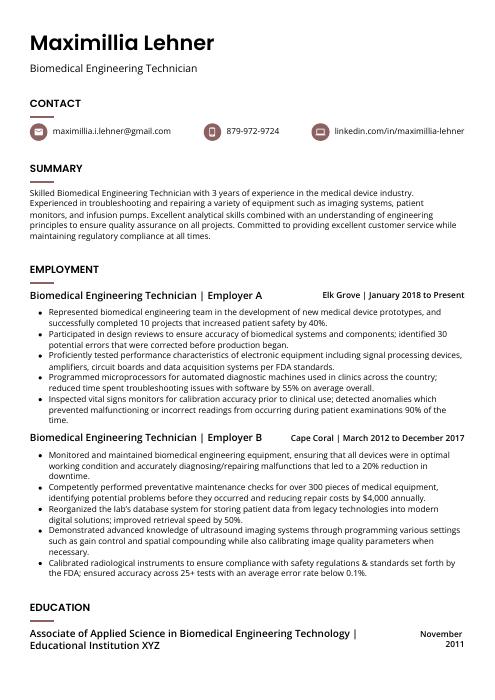 Fossa
Fossa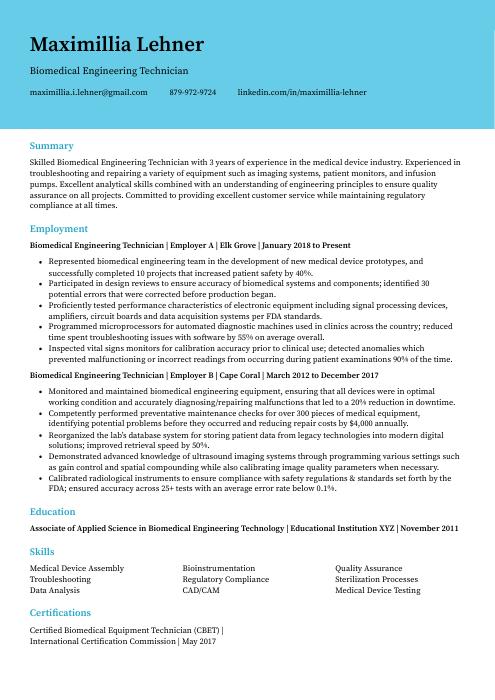 Dugong
Dugong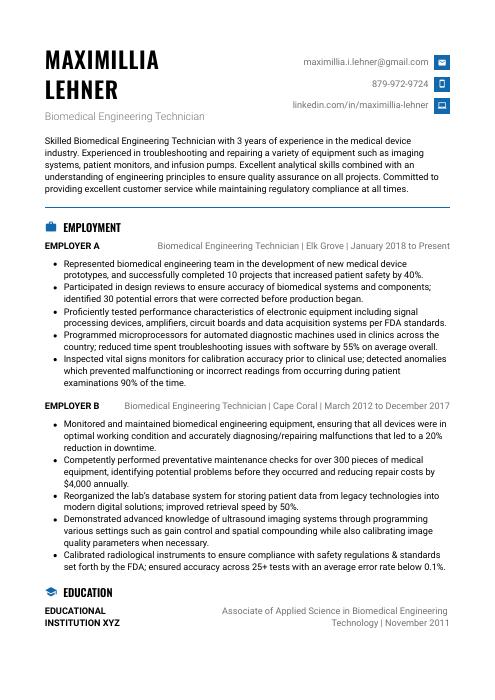 Echidna
Echidna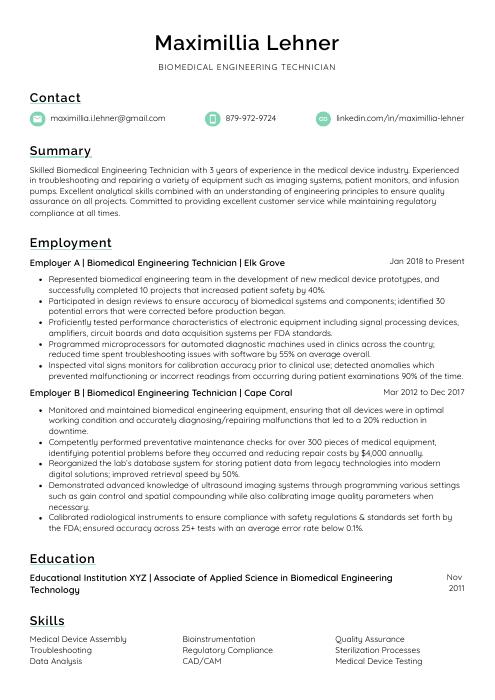 Lorikeet
Lorikeet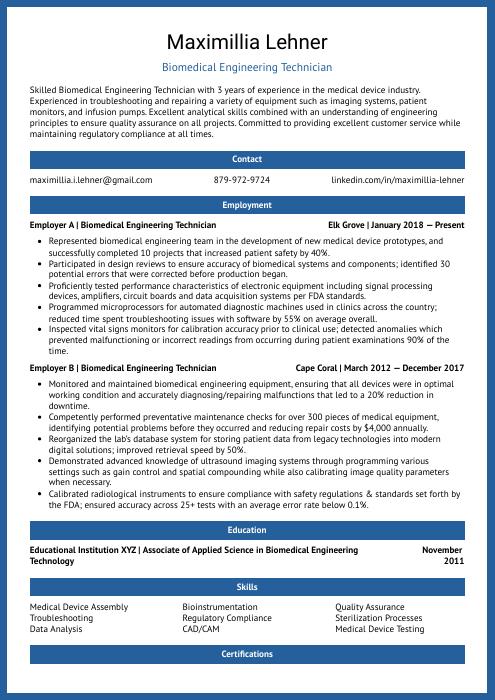 Ocelot
Ocelot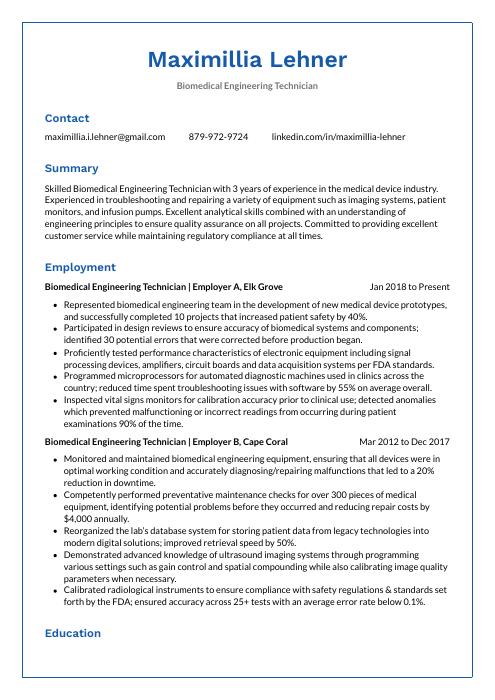 Markhor
Markhor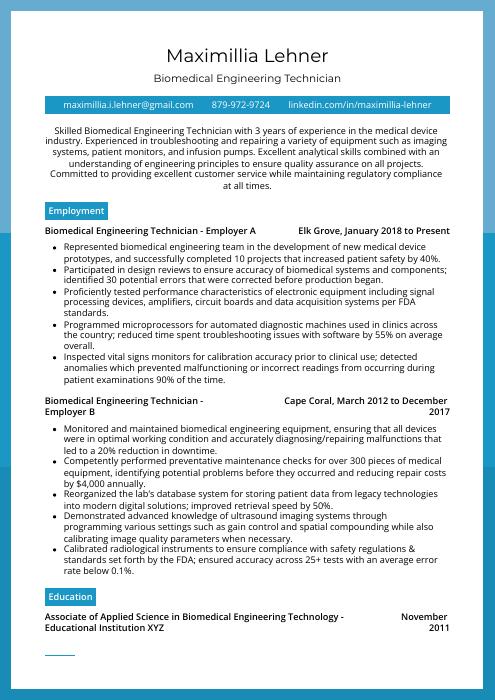 Rhea
Rhea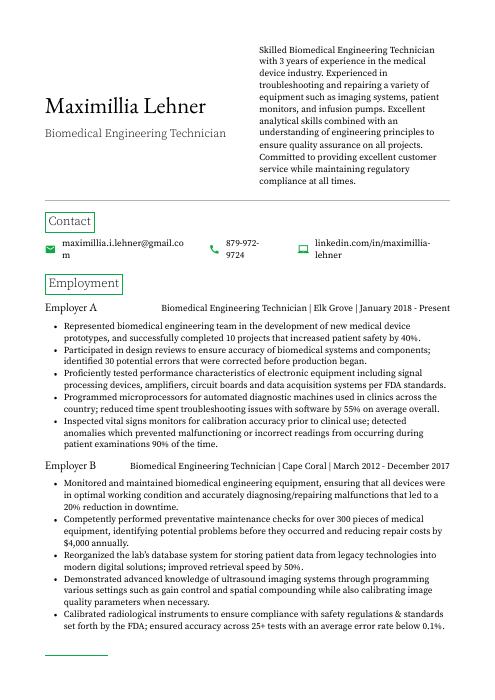 Quokka
Quokka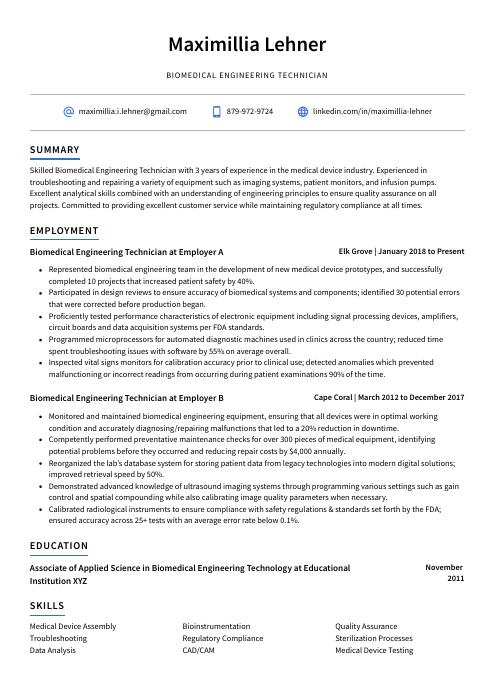 Axolotl
Axolotl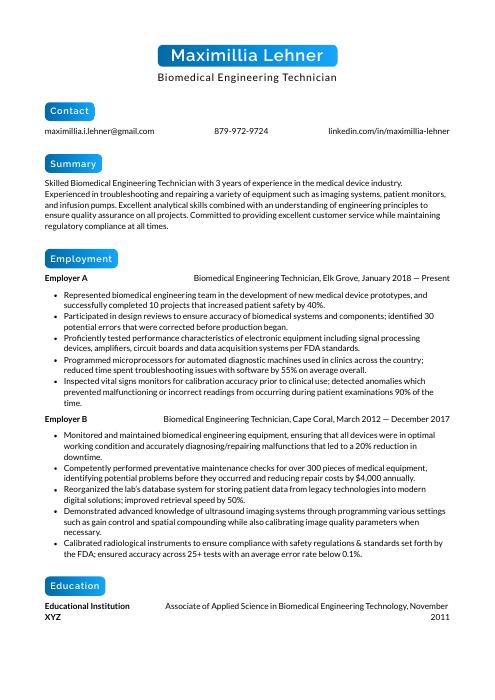 Kinkajou
Kinkajou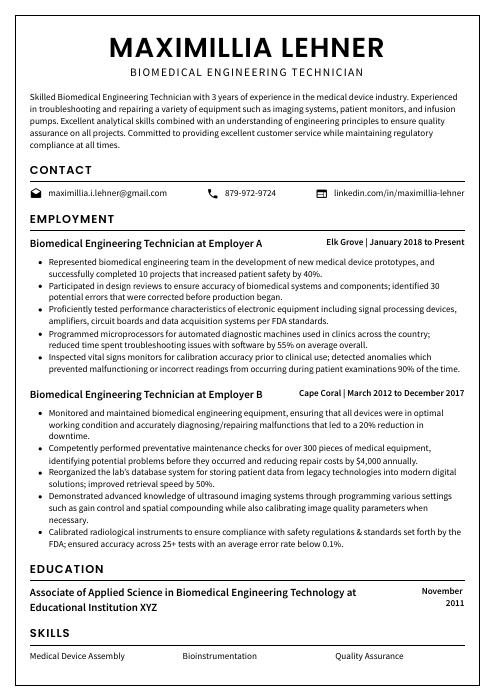 Cormorant
Cormorant Rezjumei
Rezjumei
